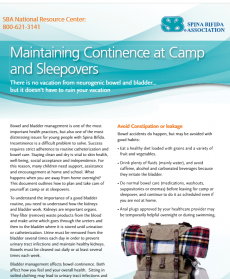There are effective ways to manage continence at home and away.
Bowel and bladder management is one of the most important health practices, but also one of the most distressing issues for young people with Spina Bifida.
Success requires strict adherence to routine catheterization and bowel care. Staying clean and dry is vital to skin health, well-being, social acceptance, and independence. For this reason, many children need support, assistance, and encouragement at home and school. What happens when you are away from home overnight?
Avoid Constipation or Leakage
Bowel accidents do happen, but may be avoided with good habits:
- Eat a healthy diet loaded with grains and fruit and vegetables.
- Drink plenty of fluids, especially water, and avoid caffeine alcohol, and carbonated beverages because they irate the bladder.
- Do normal bowel care (medications, washouts, suppositories and enemas) before leaving for camp or sleepover, and continue to do it as scheduled.
- Anal plugs approved by your health care provider may be temporarily helpful overnight or swimming.
Supply Kit
Before you leave home, pack your bag! You will need many things including:
- Packaged disposable catheters (bring extra)
- Lubrication, unless catheters are pre-lubricated
- Wet wipes
- Hand held mirror
- Pads or disposable briefs, if needed
- Hand soap
- Plastic bags for soiled items or disposal of used equipment
- Clean clothes, especially extra underwear
Tips about the space you need for bowel and bladder care
- Be sure you have a space that allows for privacy (door that can easily be locked and unlocked, appropriate lighting).
- Find a bathroom large enough for you to move as needed, fully accessible with wide doorways and with safety rails firmly on the wall if standing or transferring is necessary.
- The sink must be accessible.
- Wash your hands before and after bladder and bowel routine.
- Perform bladder care first, then bowel care.
- While undressed, do careful skin inspection for redness or irritation.
- Check your appearance for cleanliness and neatness.
- Tidy the bathroom before leaving.
Other considerations
- Practice at home.
- You may need a reminder such as an alarm on your watch or phone.
- If you need assistance, be sure to let a friend or adult know how they can help before you arrive.
- If you have a trusted person that you can tell about your bowel and bladder needs, ask that person to alert you if they notice unpleasant smells or leakage.
- Do not allow a stranger or person you do not trust to assist you with your personal care.
- Report any person who makes you feel unsafe or uncomfortable
- Keep copies of your prescriptions, important medical records or medical alert information when away from home.
- If you have a shunt, bring copies of your most recent scans, and information about your shunt in case of a medical emergency.
- Be aware of the nearest hospital and ensure there is a responsible adult to provide emergency care or transportation.
This information does not constitute medical advice for any individual. As special cases may vary from the general information presented here, SBA advises readers to consult a qualified medical or other professional on an individual basis.
Tags



